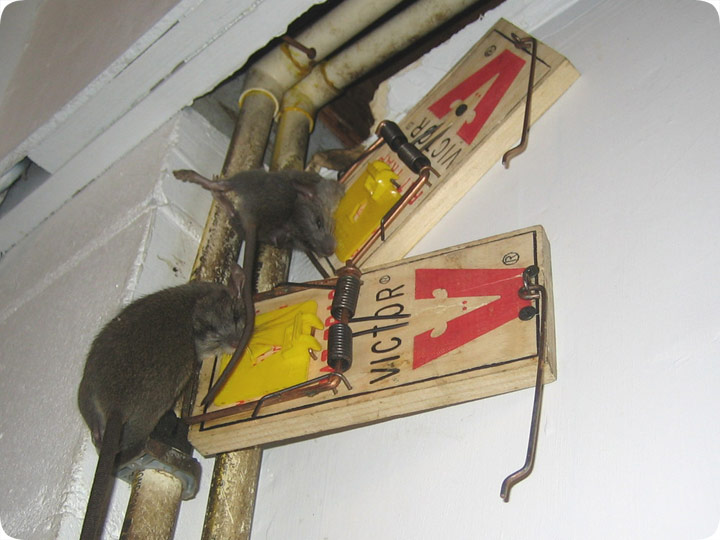-
info@aaanimalcontrol.com
Call us for help in your town
Humane Wildlife Education
Rat Extermination

I know the above photo may not look pleasant, but it's part of a proper approach to rat control. To cause the least suffering to rats, and to solve the problem permanently, it's important to seal up the entire house, so that no more rats can get in. Then set traps on the pathways that rats use, and you'll catch the few that are sealed inside, and then the problem is solved forever. In the above case, rats were running up and down pipes leading from the garage to the attic. They were going to the garage to search for food. I set traps right on the pipes, bolted to the walls, and the rats hit the traps as they travelled along the pipes. I caught the rats in this house, and solved the problem for good. That's how to exterminate rats.
Do it yourself: Visit my How To Get Rid of Rats page for tips and advice.
Get professional help: Visit my Nationwide Pro Directory of wildlife removal experts.
Why rats don’t always eat poison - Rats are scavengers and their behavior as such makes them difficult to poison. An animal that scavenges eats everything and anything. These creatures are not afraid to try new foods. To prevent death from improper eating habits, scavengers will eat a small amount of something and then wait. When the appropriate amount of time has passed and the food did not make the rat sick, the animal will return and continue eating. This type of behavior means that successful poisons must have appealing flavors and must be time-released. If a rat eats poison, gets sick, and survives, it will never go near the poison again. Another reason why rats don’t eat poison is because they have access to better food elsewhere. Most poisons are put in a base made of grain flavors. If there is a pile of compost just outside the wall, a rat will go for the compost because it is more flavorful. There is no fool-proof method for ensuring poison works. If you set it out and see no activity, consider switching you control methods to trapping. Trapping is quick and effective and will not result in dead rats hidden inside of the walls. For these reasons and many others, rat extermination is best performed with snap traps. Ultimately, however, as stated - the most important thing is sealing shut the entry holes. This is far more important than the actual extermination of rats.
For more wildlife stories, click my Wildlife Blog or click my below banner to hire a local trapper.





















